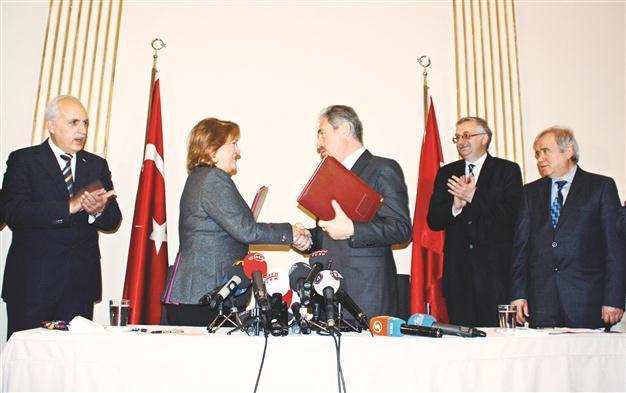Protocol signed for restoration of iconic Atatürk Culture Center
ISTANBUL- Hürriyet Daily News

Culture and Tourism Minister Ertuğrul Günay and Sabancı Holding Chairwoman Güler Sabancı yesterday signed a protocol for the restoration of the AKM. The holding will support fund for the restoration project. DAILY NEWS photo, Emrah GÜREL
Culture and Tourism Minister Ertuğrul Günay signed a financial protocol with Sabancı Holding Chairwoman Güler Sabancı yesterday, regarding the restoration of the historic Atatürk Culture Center (AKM) located in Istanbul’s Taksim Square.Günay said the AKM would be renovated faithfully to its original form, adding that only infrastructural changes are being considered.
The restoration project will be put out to tender at the end of March, and the Center is planned to come into art lovers’ service in October 2013. “Our aim is to restart cultural activities there on the 90th anniversary of the foundation of the Turkish Republic,” Günay said.
30 milion Lira fund
Güler Sabancı, in the name of Sabancı Holding, said they would support the project with a 30 million Turkish Lira budgeted fund, adding they could not stand idly by on such an important project.
“This center is a landmark for the history of the Turkish Republic; when Ertuğrul Günay came to us with an offer to renovate it with our support we could not be indifferent, we will be proud to bring stanbul’s art lovers together with the new AKM,” Sabancı said.
“Anti-earthquake reinforcement is the most important reason for development here. The heating and cooling, lighting and sound systems will also be restructured. We will finally attain an art culture befitting Istanbul,” Günay said, adding that no significant changes in the structure of the building will appear in the restoration work plans.
The center’s name will remain AKM, but an opera hall will be dedicated to the late businessman Sakıp Sabancı and named the Sabancı Opera Hall, Günay said.
He emphasized the historical importance of the AKM while explaining they experienced difficulties while trying to find financial support for the project.
“We had expected requests from various financial circles for such a project but no one applied. Then we decided to contact Güler Sabancı in the name of Sabancı Holding, which previously founded various culture centers in Adana, Malatya, Kahramanmaraş and Kocaeli provinces and gave them to the Ministry of Culture and Tourism,” Günay said.
Suit against the project
Günay said the iconic AKM was linked with “Turkey’s painful history of democracy,” emphasizing that the coups in Turkish history also have a place in the center’s story. “In the 1970s, when Turkey’s first coup d’etat was on the doorstep, a controversial fire brought the theater’s curtains down. In 1977 it started to serve again until 2008, but it needed to be reworked. The latest project is the necessary step.”
The Culture, Art and Tourism Laborers’ Union (Kültür Sanat-Sen) filed a suit against the Culture and Tourism Ministry’s project in June 2009. With the court’s order for a stay of execution a month later, the Istanbul 2010 European Capital of Culture Agency stopped all work relating to the restoration of the AKM. Günay said there was once a chance to use those funds, but it was wasted.
















